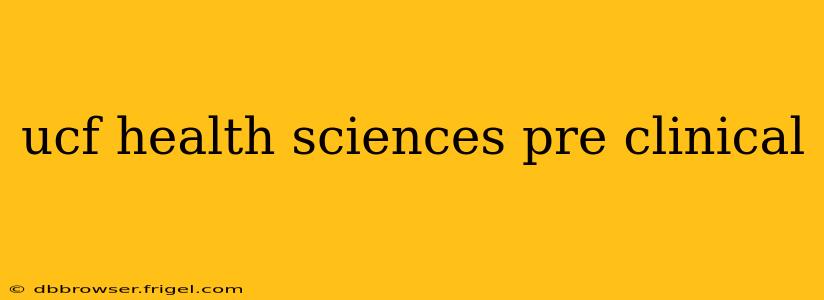The pre-clinical years at UCF's College of Medicine are a crucial foundation for your future medical career. This rigorous program prepares students for the clinical rotations and the challenges of practicing medicine. This guide provides an in-depth look at what to expect, covering curriculum details, student life, and tips for success.
What are the Pre-Clinical Years at UCF College of Medicine?
The pre-clinical years at UCF Health Sciences typically encompass the first two years of medical school. During this time, students delve into the foundational sciences vital for understanding human health and disease. This immersive curriculum covers a broad range of subjects, including anatomy, biochemistry, physiology, microbiology, immunology, pathology, pharmacology, and behavioral sciences. The focus is on developing a strong understanding of the basic mechanisms of disease and how the human body functions.
What is the Curriculum Like in the Pre-Clinical Years?
UCF's curriculum emphasizes active learning and problem-based learning (PBL). This means learning isn't just about memorizing facts; it's about applying that knowledge to solve real-world clinical scenarios. Students work in small groups to analyze cases, discuss diagnoses, and develop treatment plans. This collaborative approach fosters critical thinking and teamwork, skills essential for future medical practice. Lectures are supplemented with labs, small group sessions, and self-directed learning. The curriculum is designed to be rigorous and demanding, reflecting the high standards of medical education at UCF.
What Classes are Covered in the Pre-Clinical Years?
The specific course titles and structures can evolve, so it's best to consult the official UCF College of Medicine website for the most up-to-date information. However, generally expect a comprehensive exploration of:
- Anatomy: Detailed study of the human body's structure.
- Physiology: Understanding the function of the various body systems.
- Biochemistry: The chemical processes within living organisms.
- Microbiology & Immunology: Study of microorganisms and the body's immune response.
- Pathology: The study of disease.
- Pharmacology: The study of drugs and their effects.
- Behavioral Sciences: Understanding the psychological and social factors influencing health.
How is the PBL Curriculum Structured at UCF?
Problem-based learning (PBL) forms a cornerstone of UCF's pre-clinical curriculum. Students are presented with realistic clinical cases and work collaboratively to diagnose and treat the patient. This approach encourages active learning, critical thinking, and the development of problem-solving skills. Facilitators guide the learning process, ensuring students explore the relevant concepts and develop a deeper understanding of the material.
What Resources are Available to Pre-Clinical Students?
UCF provides ample resources to support student success during the pre-clinical years. These include:
- Dedicated faculty: Professors and instructors are readily available for guidance and support.
- Learning resources: Access to libraries, online databases, and study materials.
- Peer support: Study groups and collaborative learning opportunities are abundant.
- Student services: Counseling, academic advising, and other support services are available.
What is the Lifestyle Like for Pre-Clinical Medical Students?
The pre-clinical years are demanding and require significant dedication. Students need to manage their time effectively to balance their studies, extracurricular activities, and personal life. The workload is intense, and time management skills are crucial for success. Many students find it beneficial to establish a structured study schedule and seek support when needed. Finding a supportive community of classmates and utilizing the available resources is essential for maintaining well-being during this challenging but rewarding period.
How Do Pre-Clinical Grades Impact Clinical Rotations?
While UCF likely doesn't explicitly tie pre-clinical grades to specific clinical rotation assignments, strong performance demonstrates readiness for the increased responsibility and clinical reasoning required in later years. A solid foundation in the basic sciences is essential for success in clinical rotations. Therefore, consistent effort and high achievement during the pre-clinical years are highly beneficial to overall medical school success.
This guide provides a general overview; for precise details about the curriculum, specific courses, and available resources, always refer to the official UCF College of Medicine website. Good luck to all aspiring physicians!
